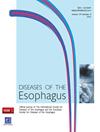641.系统性硬化症患者胃食管反流手术治疗方法的比较
IF 2.3
3区 医学
Q3 GASTROENTEROLOGY & HEPATOLOGY
引用次数: 0
摘要
背景 本研究旨在比较系统性硬化症患者难治性胃食管反流病(GERD)的治疗效果,旨在比较不同手术方法的效果。方法 本文介绍了 2005 年至 2024 年期间被诊断为系统性硬化症并转诊至本中心的 44 名患者。仅有 7 名患者接受了胃食管反流手术治疗。手术方法有三种:部分胃底折叠术、Roux-en-Y 胃成形术和食管切除术。结果 44 名患者中,只有 15.9% 接受了手术治疗。其中 2 人接受了部分胃底折叠术,2 人接受了食管切除术,3 人接受了胃旁路术。接受食管切除术的患者食管排空延迟或不完全,而接受胃分流术的患者即使有完全胃食管反流,在吞钡检查中也显示食管排空良好。只有没有胃食管反流的患者才会接受部分胃底折叠术。我们没有发现死亡率,胃旁路术的发病率为 33%,而胃底折叠术和食管切除术组没有发病率。接受胃旁路手术的患者的生活质量和反流控制情况更好。结论 建议在选择性病例中采用手术方法治疗系统性硬化症患者的胃食管反流病,并应根据每位患者的临床情况和食管排空情况量身定制。本文章由计算机程序翻译,如有差异,请以英文原文为准。
641. COMPARISON OF SURGICAL TREATMENTS FOR GASTROESOPHAGEAL REFLUX IN SYSTEMIC SCLEROSIS
Background This study proposes to compare the results of refractory gastroesophageal reflux disease (GERD) in patients with Systemic sclerosis, aiming to compare the results of different surgical approaches. Methods 44 patients are presented, followed between 2005 and 2024, diagnosed with Systemic Sclerosis and referred to our service. Just 7 patients were submitted to surgical treatment of GERD. Three different were done: partial fundoplication, Roux-en-Y gastroplasty, and Esophagectomy. Results Considering the 44 patients, just 15,9 % were operated. Two underwent partial fundoplication, 2 esophagectomies, and 3 gastric bypasses. The patients submitted to esophagectomy had delayed or incomplete esophagic emptying, and the patients who underwent gastric bypass, even with total aperistalsis showed good esophagic emptying during a barium swallow. Only patients without aperistalsis were offered partial fundoplication. We had no mortality, and the morbidity was 33% in gastric Bypass, with no morbidity in the fundoplication and esophagectomy group. The patients submitted to bypass presented better QOL and reflux control. Conclusion The surgical approach to the treatment of GERD in Systemic sclerosis is recommended just in selective cases and should be tailored concerning the clinical conditions and the esophagus emptying of each patient.
求助全文
通过发布文献求助,成功后即可免费获取论文全文。
去求助
来源期刊

Diseases of the Esophagus
医学-胃肠肝病学
CiteScore
5.30
自引率
7.70%
发文量
568
审稿时长
6 months
期刊介绍:
Diseases of the Esophagus covers all aspects of the esophagus - etiology, investigation and diagnosis, and both medical and surgical treatment.
 求助内容:
求助内容: 应助结果提醒方式:
应助结果提醒方式:


